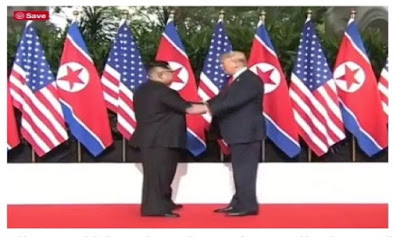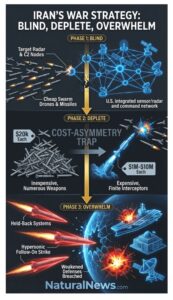An implicit coalition of corporate media, Democratic partisans and others loyal to the national security state are actively hostile to any agreement that would endanger the continuation of the 70-year-old Cold War between the United States and North Korea.
The hostility toward Donald Trump on the part of both corporate media (except for Fox News) and the Democratic Party establishment is obviously a factor in the negative response to the summit. Trump’s dysfunctional persona, extremist domestic strategy and attacks on the press had already created a hyper-adversarial political atmosphere that surrounds everything Trump says or does.
But media coverage of the Singapore summit shows that something much bigger and more sinister is now in play: a consensus among foreign policy and national security elites and their media allies that Trump’s pursuit of an agreement with Kim on denuclearization threatens to undo seventy years of U.S. military dominance in Northeast Asia.
Those elites are determined to resist the political-diplomatic thrust of the Trump administration in negotiating with Kim and have already begun to sound the alarm about the danger Trump poses to the US power position. Not surprisingly Democrats in Congress are already aligning themselves with the national security elite on the issue.
The real concern of the opposition to Trump’s diplomacy, therefore, is no longer that he cannot succeed in getting an agreement with Kim on denuclearization but that he will succeed.
The elite media-security framing of the Trump-Kim summit in the initial week was to cast it as having failed to obtain anything concrete from Kim Jong-un, while giving up immensely valuable concessions to Kim. Almost without exception the line from journalists, pundits and national security elite alike compared the joint statement to the texts of previous agreements with North Korea and found that it was completely lacking in detail.
Ignoring Kim’s Concessions
Thus The Washington Post quoted a tweet by Richard Haas, chairman of the über-establishment Council on Foreign Relations, that the summit “changed nothing” but “makes it harder to keep sanctions in place, further reducing pressure on North Korea to reduce (much less give up) its nuclear weapons and missiles.”
The New York Times cited the criticism of former CIA official Bruce Klingner, now at the Heritage Foundation, that the joint statement failed to commit North Korea to do as much as promised in agreements negotiated in 1994 and 2005. And CNN reported that the Joint Declaration “did not appear to make any significant progress” in committing the North Koreans to complete denuclearization, citing the use of the word “reaffirmed” in the document, which it opined “highlighted the lack of fresh commitments.”
Those criticisms of the joint statement conveniently ignored the fact that Kim had already made the most significant concession he could have made in advance of detailed negotiations between the two states when he committed North Korea to ending the testing of both nuclear weapons and long-range missiles in April following meetings with then CIA Director Mike Pompeo earlier in the month. That commitment by Kim meant that North Korea was entering negotiations with the United States before it had achieved a credible threat to hit the United States with an ICBM armed with a nuclear weapon.
The fact that no mention of Kim’s centrally important concession can be found in any of the reports or commentaries on the summit underlines the scarcely hidden agenda at play. Mentioning that fact would have pointed to understandings that Pompeo had already reached with Kim and his envoy to Washington before the summit and were not reflected in the brief text. Pompeo actually confirmed this in remarks made in Detroit on June 18, which only Bloomberg news reported.
Furthermore, the trashing of the summit also employed the politically motivated trick of deliberately ignoring the vast difference between a joint statement of the first ever meeting between the two heads of state and past agreements on denuclearization reached after weeks or months of intensive negotiations.
What really alarmed and even outraged the media and their elite national security allies, however, was that Trump not only announced that he would suspend U.S.-South Korean joint exercises or “war games” as long as the North Koreans were negotiating in good faith on denuclearization, but even called the exercises “very provocative.”
One journalist and commentator after another, including CNN and the Times’ Nicholas Kristof, denounced that description as “adopting” his adversary’s “rhetoric” about the exercises. In a podcast with former National Security Council spokesperson Tommy Vietor, former NSC official Kelley Magsamen, now at the Democratic Party’s Center for American Progress, rather than acknowledging that a vital principle of diplomacy is to put oneself in the position of one’s opponent, charged that Trump had “internalized the language of our adversaries.”
The media and critics deploring Trump’s willingness to suspend the joint U.S.-South Korean war games have portrayed it as a betrayal of the security alliance with South Korea. But that claim merely dismisses the desires of South Korean President Moon and betrays ignorance of the history of U.S.-South Korean war games.
Been Called ‘Provocative’ Before
When Trump called the drills “provocative,” he was merely expressing the same view that some US officials adopted as long ago as the mid-1980s. These officials also called the exercises “provocative,” according to a State Department official interviewed by historian Leon Sigal for his authoritative account of US nuclear diplomacy with North Korea.
Donald Gregg, the US Ambassador to South Korea from 1989 to 1993, observed in an interview with Sigal that the North Koreans mobilized their forces at great expense every time the drills, called “Team Spirit,” were held in the 1980s and early 1990s.
Former Director of National Intelligence James Clapper, who was an Army general and chief of US military intelligence in Korea in the early 1990s, later confirmed to Sigal that the North Koreans would “go nuts” during the annual Team Spirit exercises. Part of the reason for that extreme North Korean anxiety about the drills was that the United States routinely flew nuclear capable B-52s over South Korea as part of the exercises – a practice resumed in recent years after a long hiatus and no doubt reviving the trauma of the US devastation of North Korea from 1950-53.
Ambassador Gregg had supported the idea of suspending the annual Team Spirit exercise in 1992 as part of a proposed effort to get North Korea to change its mind about wanting nuclear weapons. Furthermore the South Korean government itself formally announced in January 1992 that the Team Spirit exercises were being suspended in light of “progress” on North-South nuclear issues. Furthermore, the Clinton administration canceled Team Spirit drills each year from 1994 to 1996 in an effort to demonstrate the US seriousness in pursuing an agreement with North Korea for an end to its production of plutonium for nuclear weapons.
The provocative character of the joint U.S.-South Korean military drills became even more pronounced after North Korea began testing nuclear weapons and then intercontinental ballistic missiles. In 2015, the US and South Korea adopted a new war plan codenamed OPLAN 5015, which calls for surgical strikes on North Korea’s nuclear and missiles sites and command-and-control facilities, as well as “decapitation” raids targeting senior North Korean leaders, according to the South Korean Yonhap News Agency.
Although the US Command in South Korea has always insisted that all joint exercises are defensive in nature, press reports said that the war plan, which could only be based on a first strike strategy, would be the basis of the publicly announced Ulchi Freedom Guardian war games scheduled for August 2017.
What the national security elite and their media allies are really upset about is the real possibility that Trump will succeed in negotiating a denuclearization deal with North Korea that includes a formal end to the Korean War. That could complicate the Pentagon’s continuing strengthening of the US military posture vis-à-vis China.
Fareed Zakaria, CNN’s establishment foreign policy pundit, recalled the Pentagon’s aim during the Clinton administration to maintain at least 100,000 U.S. troops in Northeast Asia, and worried that, if the US military alliance with South Korea is de-emphasized, the US would “fall below that threshold.”
Ian Bremmer, the CBS News national security pundit, explained that Trump’s willingness to suspend military exercises means that “the United States is probably going to be a much more marginal player at the end of the day in this region.”
Magsamen suggested a similar concern about Trump weakening the alliance with South Korea in an interview with Vietor, commenting that “a lot of us…see the North Korean challenge in a broader context vis-à-vis our adversaries, like China and Russia.”
These are early indications of a showdown between Trump and the elite alliance arrayed against him. Senate Democrats can be expected to push back against any agreement that portends possible withdrawal from South Korea, as indicated by the bill proposed by Senators Chris Murphy and Tammy Duckworth to forbid troops withdrawal without Pentagon approval.
If his opponents are dissatisfied with the agreement Trump negotiates, the Senate probably wouldn’t ratify a treaty to end the Korean War that Pyongyang would certainly demand. The most promising diplomatic development in East Asia in seven decades could thus be nullified by the shared interests of the loose coalition in preserving a status quo of tension and possible war.
Gareth Porter, an investigative historian and journalist specializing in US national security policy, received the UK-based Gellhorn Prize for journalism for 2011 for articles on the U.S. war in Afghanistan. His new book is Manufactured Crisis: the Untold Story of the Iran Nuclear Scare. He can be contacted at porter.gareth50@gmail.com. Reprinted from Consortium News with the author’s permission.
Read more by Gareth Porter
- How Corporate Media Got the Trump-Kim Summit All Wrong – June 11th, 2018
- How Corporate Media Are Undermining a US-North Korea Nuclear Weapons Deal – May 23rd, 2018
- Back to the Future? Bolton, Trump, and Iranian Regime Change – May 20th, 2018
- The Latest Act in Israel’s Iran Nuclear Disinformation Campaign – May 4th, 2018
- Did John Bolton Leak Intelligence To Sabotage a Trump-Kim Deal? – May 1st, 2018
Author: Gareth Porter
Gareth Porter is an investigative historian and journalist specializing in U.S. national security policy. The paperback edition of his latest book, Perils of Dominance: Imbalance of Power and the Road to War in Vietnam, was published in 2006.
Please follow and like us:




Ck the Birchers (TheNewAmerican.com, JBS.org), Richard: the Korean war was for purpose of ratifying the United Nations (org.) and getting USA, now Jew S A, entangled in moronic, suicidal treaties and commitments which don't serve national interests–getting us involved in idiot conflicts, getting men killed, spending the people's money–all for nothing, indeed, spending money for sake of destroying USA, as we see has happened, getting people USED to idea that we waste time, effort, money, and lives for our own destruction–again, as we see has happened so brilliantly.
Does it surprise anybody that the US war department position would be challenged by a new round of cooperation between NK and the US? Of course the deep state wants to perpetuate the cold war. It means jobs for people who work in "defense" plants, it means more raises and more praise for doing God's work in producing weaponry that will help kill more and more people that would dare to challenge our defense industries and our military/industrial complex? How dare anybody desire peace…..why, that's outrageous!
The choice of Pompeo and legendary warmonger Bolton says it all. It's war, more war, and nothing but war. Stupid Americans possess enormous power when they stick together and that's why propaganda is meant to be cleaving. Keep people fighting and disagreeing among each other, it works every time. Meanwhile, stay close to unions and defense plant workers, they represent a solid voting block and false "defense" of the United States helps get out the votes of these idiots.
War is peace. Truth is a lie.
Since I never found out why the Korean War happened in the first place, I appreciate ending it. As far as I can tell, the strange wars that start and end without justification are the war laboratories to keep up the profession of war making. The money made on financing war is always the ultimate reason for the Satanic Ritual Killing called WAR.